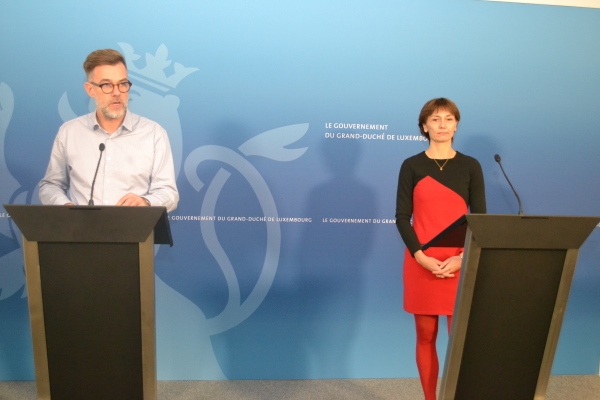 (L-R) Franz Fayot, Minister of the Economy; Pascale Junker, Head of Luxembourg Strategy;
Credit: MECO
(L-R) Franz Fayot, Minister of the Economy; Pascale Junker, Head of Luxembourg Strategy;
Credit: MECO
On Friday 25 November 2022, Luxembourg's Minister of the Economy, Franz Fayot, nnounced the upcoming launch of a survey in which the general public, residents and cross-border workers, business associations and municipalities can give their opinion on possible future scenarios for the Luxembourg economy.
Within the Ministry of the Economy, the Luxembourg Strategy department is responsible for carrying out foresight studies (études de prospective) in order to help transform the country's economy towards greater competitiveness, inclusiveness and resilience for decades to come. Following a collaborative process, Luxembourg Strategy has designed three different scenarios of the possible future of the Luxembourg economy by 2050.
This public survey begins on Friday 2 December 2022, on the occasion of UNESCO World Futures Day, and will end on Monday 9 January 2023. It will take the form of a questionnaire accessible via www.eco2050.lu (link active from 2 December 2022) and available in French, Luxembourgish and English.
Targeting especially the younger generations who are the first concerned by the state of the economy in 2050, the consultation aims to collect everyone's proposals and contributions in relation to the scenarios developed with a view to preparing a strategic vision which will be published at the end of March 2023.
The three scenarios
The consultation follows the presentation to the public on 18 October 2022 of three possible future scenarios for economic development by 2050. These scenarios describe various states of the world that could affect the economy of Luxembourg and Greater Region in 2050. Between three scenarios with different characteristics (“socio-economic sleepwalker”, “bio-regional circularity” and “techno-digital optimism”) a space for a possible future emerging senarios are plausible of distinct, coherent, exploratory and qualitative situations. Plausible also because they aim to take into account feasibility in a world with finite resources and basic social needs to be satisfied. They do not predict the future, are not controllable and do not represent desirable or desired futures. The value of a scenario does not reside so much in the accuracy of its predictions as in the collective consciousness that it promotes and in the use of the scenarios that is then made.
The strategic vision
The three scenarios as well as the opinions and contributions resulting from the public consultation are the basis for the development in the coming months of a strategic vision of the economic future which is the response to the different scenarios. How is it desirable that the national economy develops, in the next 27 years, to meet the challenges and exalt the opportunities contained in the three scenarios? The answer to such questions forms the basis for developing such a vision.
This vision is a coherent set of orientations, objectives and general measures for the economy, the relevance of which must stand the test of time and the validity of which must remain in all scenarios. It is then a “no regrets” strategic economic vision which constitutes a frame of reference to reinforce, at the national level, the effectiveness of present and future sectoral economic strategies.
On Wednesday 14 December 2022 and Monday 16 January 2023, Minister Fayot will invite a group of people who have answered the questionnaire to discuss the future of the economy directly with them. Interested persons will be able to express their interest in this debate at the end of the consultation questionnaire.
Further information is available on: https://luxstrategie.gouvernement.lu.








